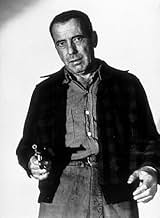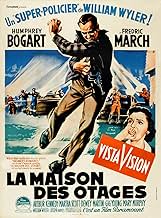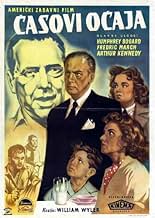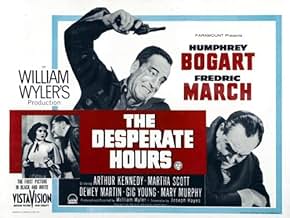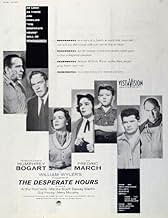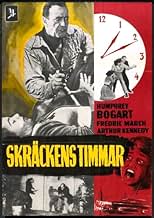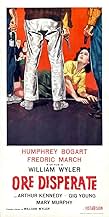IMDb रेटिंग
7.4/10
11 हज़ार
आपकी रेटिंग
अपनी भाषा में प्लॉट जोड़ेंThree escaped convicts move in on and terrorize a suburban household.Three escaped convicts move in on and terrorize a suburban household.Three escaped convicts move in on and terrorize a suburban household.
- पुरस्कार
- 2 जीत और कुल 1 नामांकन
Walter Baldwin
- George Patterson
- (बिना क्रेडिट के)
John Benson
- Bellboy
- (बिना क्रेडिट के)
Paul E. Burns
- Chef at Al's Dining Room
- (बिना क्रेडिट के)
Edmund Cobb
- Mr. Walling
- (बिना क्रेडिट के)
फ़ीचर्ड समीक्षाएं
THE DESPERATE HOURS
Aspect ratio: 1.85:1 (VistaVision)
Sound format: Mono
(Black and white)
The patriarch of a middle-class suburban family (Fredric March) is forced to take action when they're held hostage in their own home by three escaped convicts, one of whom (Humphrey Bogart) is an experienced lifer with nothing to lose...
The first and only pairing of superstars Bogart and March is a tightly-wound thriller, written by Joseph Hayes (based on his novel and stageplay, inspired by actual events), and directed by Hollywood veteran William Wyler, distancing himself from the 'women's pictures' he had helped to popularize during the 1940's (THE LITTLE FOXES, MRS. MINIVER, THE HEIRESS etc.). Photographed in gleaming deep-focus VistaVision by Lee Garmes (SCARFACE, THE PARADINE CASE), the movie wrings incredible tension from the claustrophobic settings and frequent stand-offs between staunch family man March and embittered con Bogart. The movie's themes are fairly conservative and the outcome is never really in doubt, but this is a top-drawer thriller from Hollywood's 'golden age'. Also starring Arthur Kennedy, Martha Scott, Dewey Martin and Gig Young in crucial supporting roles. Unmissable.
NB. Though nowhere near as dreadful as most critics would have you believe, Michael Cimino's remake DESPERATE HOURS (1990) isn't a patch on the original.
Aspect ratio: 1.85:1 (VistaVision)
Sound format: Mono
(Black and white)
The patriarch of a middle-class suburban family (Fredric March) is forced to take action when they're held hostage in their own home by three escaped convicts, one of whom (Humphrey Bogart) is an experienced lifer with nothing to lose...
The first and only pairing of superstars Bogart and March is a tightly-wound thriller, written by Joseph Hayes (based on his novel and stageplay, inspired by actual events), and directed by Hollywood veteran William Wyler, distancing himself from the 'women's pictures' he had helped to popularize during the 1940's (THE LITTLE FOXES, MRS. MINIVER, THE HEIRESS etc.). Photographed in gleaming deep-focus VistaVision by Lee Garmes (SCARFACE, THE PARADINE CASE), the movie wrings incredible tension from the claustrophobic settings and frequent stand-offs between staunch family man March and embittered con Bogart. The movie's themes are fairly conservative and the outcome is never really in doubt, but this is a top-drawer thriller from Hollywood's 'golden age'. Also starring Arthur Kennedy, Martha Scott, Dewey Martin and Gig Young in crucial supporting roles. Unmissable.
NB. Though nowhere near as dreadful as most critics would have you believe, Michael Cimino's remake DESPERATE HOURS (1990) isn't a patch on the original.
The adaptation to the screen of Joseph Hayes' play by Mr. Hayes, himself, is given an excellent treatment by William Wyler, one of the great film directors of all times. The play was claustrophobic; there is little to be done in opening it and at times it feels as though we are in the theater watching the drama unfolds. Instead of detracting from it, this atmosphere contributes to the drama we are watching.
This film juxtaposes good and evil. We have the Hilliard household, which could be the set from anyone of the sitcoms of late 50s TV. There is the father figure, the decent Dan who is happily married to Eleonor and they have two children that seem to be their pride and joy.
Into this house a trio of escaped convicts arrive; they are ruthless. Led by Glenn Griffin, these desperate men bring panic to the Hilliards, who become paralyzed by the harm they might encounter at the hands of the criminals.
This film is a tribute to the great acting of Humphrey Bogart and Frederick March. Their characters are well defined and both actors play extremely well together. Mr. March was an accomplished actor of both the theater and the screen. Mr. Bogart holds his own against his co-star in a show of wills, unrivaled in any of the films of the 50s.
The cast assembled was first rate. Under Wyler's direction they give detailed performances. Martha Scott, Arthur Kennedy, Gig Young, Dewey Martin, among others, shine in this movie.
This film juxtaposes good and evil. We have the Hilliard household, which could be the set from anyone of the sitcoms of late 50s TV. There is the father figure, the decent Dan who is happily married to Eleonor and they have two children that seem to be their pride and joy.
Into this house a trio of escaped convicts arrive; they are ruthless. Led by Glenn Griffin, these desperate men bring panic to the Hilliards, who become paralyzed by the harm they might encounter at the hands of the criminals.
This film is a tribute to the great acting of Humphrey Bogart and Frederick March. Their characters are well defined and both actors play extremely well together. Mr. March was an accomplished actor of both the theater and the screen. Mr. Bogart holds his own against his co-star in a show of wills, unrivaled in any of the films of the 50s.
The cast assembled was first rate. Under Wyler's direction they give detailed performances. Martha Scott, Arthur Kennedy, Gig Young, Dewey Martin, among others, shine in this movie.
Frederic March, Martha Scott, Humphrey Bogart and Arthur Kennedy are just a few of the people who endure "The Desperate Hours," a 1955 film, based on the stage play and directed by William Wyler. On Broadway, the play was directed by Robert Montgomery and starred Karl Malden in the Bogart role and Paul Newman played his brother, here played by Dewey Martin. The film also stars Gig Young, Mary Murphy, Richard Eyer, and Robert Middleton.
Having just seen Bogart in the 1936 "The Petrified Forest," it was interesting to see him still taking hostages 19 years later - and in fact, looking like he'd spent the last 19 years on the run from the law. He was clearly ill during the making of this film. Though Dewey Martin looked 30 years younger than Bogie, he was in fact only 20, making the fact that they were brothers a tiny bit more plausible.
I also had recently seen "The Star Witness," a 1931 Warner Brothers film with a similar plot, which won an Oscar for best original screenplay. By 1955, it wasn't original any longer, but the execution of the story is compelling. Martha Scott is a housewife, Ellie Hilliard, alone in her suburban home when three escaped criminals (Bogart, Martin and Middleton) take over the place. Glenn Griffin (Bogart) wants to murder the Deputy Sheriff (Arthur Kennedy) who put him in prison, and he needs to wait for the delivery of some money to make good his escape. Dan Hilliard (March) and his daughter Cynthia (Murphy) walk into the situation, followed later by the Hilliard's little boy (Eyer). You'll be wondering why the son isn't knocked off - by his parents - given the trouble he causes.
The money is delayed, and of course, the police have no idea where the gang is, as Griffin has put his car in the Hilliard garage. So the hours turn into overnight. Although March and Cynthia are allowed to leave the house for work, and Cynthia has to keep a date with her boyfriend (Young), they're too terrified to say anything for fear the mother and boy will be killed. Basically the gang as well and the family become prisoners as the hours drag on.
Wyler gives us lots of frightening and suspenseful moments as the tension builds in the house, and he never lets the pace drag. Supposedly he made March and Scott do a goodbye scene for take after take because he thought March was "acting" and wanted to tire him out. An accomplished stage actor of the old school, March consistently had a great presence but didn't always emotionally connect with his characters - he does here. March and Bogart make powerful adversaries, March hitting just the right note as an angry father afraid for his family, but not afraid to talk back to Griffin. Bogart's Griffin is shrewd and admires brains and bravery in others; the family impresses him with their guts.
Bogart is marvelous in the role - though tired out, his character is determined to keep the gang together and free; he's resentful of the middle classness of the family and how out of place he and his gang are in a nice home. Unlike his Duke Mantee in "The Petrified Forest", Bogart's Griffin doesn't seem to have a sense of the hopelessness of his situation until the very end; also unlike Duke Mantee, he has a vulnerability that he demonstrates at the end.
Robert Middleton gives a scary performance as a witless member of the gang, and Martin, as Hal, displays Hal's disillusionment with the situation, his attraction to Cynthia, and the realization that he can never have someone like her if he continues down his brother's road. Gig Young is somewhat wasted as Cythia's boyfriend - it's unnecessary star casting. Martha Scott does a terrific job as the harried wife and mother. The wonderful Arthur Kennedy gives another good performance as the sheriff determined to catch Griffin.
Highly recommended for its suspenseful story, fine direction, and top performances.
Having just seen Bogart in the 1936 "The Petrified Forest," it was interesting to see him still taking hostages 19 years later - and in fact, looking like he'd spent the last 19 years on the run from the law. He was clearly ill during the making of this film. Though Dewey Martin looked 30 years younger than Bogie, he was in fact only 20, making the fact that they were brothers a tiny bit more plausible.
I also had recently seen "The Star Witness," a 1931 Warner Brothers film with a similar plot, which won an Oscar for best original screenplay. By 1955, it wasn't original any longer, but the execution of the story is compelling. Martha Scott is a housewife, Ellie Hilliard, alone in her suburban home when three escaped criminals (Bogart, Martin and Middleton) take over the place. Glenn Griffin (Bogart) wants to murder the Deputy Sheriff (Arthur Kennedy) who put him in prison, and he needs to wait for the delivery of some money to make good his escape. Dan Hilliard (March) and his daughter Cynthia (Murphy) walk into the situation, followed later by the Hilliard's little boy (Eyer). You'll be wondering why the son isn't knocked off - by his parents - given the trouble he causes.
The money is delayed, and of course, the police have no idea where the gang is, as Griffin has put his car in the Hilliard garage. So the hours turn into overnight. Although March and Cynthia are allowed to leave the house for work, and Cynthia has to keep a date with her boyfriend (Young), they're too terrified to say anything for fear the mother and boy will be killed. Basically the gang as well and the family become prisoners as the hours drag on.
Wyler gives us lots of frightening and suspenseful moments as the tension builds in the house, and he never lets the pace drag. Supposedly he made March and Scott do a goodbye scene for take after take because he thought March was "acting" and wanted to tire him out. An accomplished stage actor of the old school, March consistently had a great presence but didn't always emotionally connect with his characters - he does here. March and Bogart make powerful adversaries, March hitting just the right note as an angry father afraid for his family, but not afraid to talk back to Griffin. Bogart's Griffin is shrewd and admires brains and bravery in others; the family impresses him with their guts.
Bogart is marvelous in the role - though tired out, his character is determined to keep the gang together and free; he's resentful of the middle classness of the family and how out of place he and his gang are in a nice home. Unlike his Duke Mantee in "The Petrified Forest", Bogart's Griffin doesn't seem to have a sense of the hopelessness of his situation until the very end; also unlike Duke Mantee, he has a vulnerability that he demonstrates at the end.
Robert Middleton gives a scary performance as a witless member of the gang, and Martin, as Hal, displays Hal's disillusionment with the situation, his attraction to Cynthia, and the realization that he can never have someone like her if he continues down his brother's road. Gig Young is somewhat wasted as Cythia's boyfriend - it's unnecessary star casting. Martha Scott does a terrific job as the harried wife and mother. The wonderful Arthur Kennedy gives another good performance as the sheriff determined to catch Griffin.
Highly recommended for its suspenseful story, fine direction, and top performances.
Bogie had done films like this one before: The Petrified Forest (1936), High Sierra (1941), Key Largo (1948) and We're No Angels (1955) all with Bogie as a gangster or victim of a gangster, in a desperate setting (although the last one is a comedic spoof). Desperate Hours, however, is different this time out, Bogie (as Glen Griffin) has a whole suburban family as hostage as he tries to complete his run for freedom from the law. Is this the first such home invasion type movie? Perhaps Suddenly (1954)?
The story is simply superb. Every good narrative succeeds because of certain literary aspects: a believable story line, down-to-earth dialog that supports it, a good measure of irony at appropriate turning points, just the right amount of coincidence that can intrude on anybody's daily experience, a dogged police officer who just won't give up in the search for what he believes, and a family an ordinary family that finds within itself the courage, imagination, and strength to persevere in the face of the real threat of death.
I saw this film long ago when just a lad, so I didn't recall much of the story at all. But, being a Bogie fan, I looked forward to seeing it again when I got a hold of a DVD recently. I don't recall what movies were in the running for the Oscars that year, but I think this should have been a contender (apparently, it wasn't).
The cast was well chosen. Bogie, of course, was "made" for this part, having done so many like it in the past and that's not a side-swipe at typecasting; Robert Middleton almost steals the movie with his portrayal of the psychopathic Kobish -- a chilling portrayal; Dewey Martin as Bogie's brother, Hal, provides a sense of decency that the other two lack, the only jarring note for me: why should he? He's on the run, and drops all pretense of humanity when he decides to cut and run by himself. And, we know what happens to anybody who cuts and runs, right? Frederic March as Dan Hilliard ably shows what can happen to your principles and behavior when lives are at stake: most of life's niceties go out the window as he tries to save his family. Understandable, given the desperate situation. Martha Scott as his wife and Mary Murphy as his daughter (Cindy) are suitably frightened most of the time, but they also summon the courage to oppose the bad guys when possible. The guy who isn't used so much is Arthur Kennedy as deputy sheriff Bard, but his role is pivotal in bringing the story to a satisfactory ending. Pity, because Kennedy was as fine an actor as Bogie or March. Gig Young, as Cindy's suitor, rounds out the main cast he playing the puzzled hopeful who just won't go away when Cindy pleads with him to "stay away". It's just as well that he didn't...
The setting in small town America is just right, the picture perfect home of the Hilliards standing for the American dream that is about to threatened and even destroyed. Which gives rise to one of the best lines in cinema history, spoken by March near the end: "Get out get out of my house!" he nearly screams at Bogie, thus cementing forever in film the idea of a man's home as his castle. Bogie visibly wilts before the stern and righteous wrath of March but not only because of that does Bogie give it all up. You'll have to see the film to understand why.
Most of the action is within the confines of the Hilliard house (having been a stage play first, that makes sense) and the cinematography takes full advantage of all those nooks and crannies to enthrall the viewer and keep the suspense running. I liked particularly the reasonably long take of the camera behind the bad guys while they watch the old trash collector do his work and who seems to miss the presence of their stolen car in the garage. It's a priceless piece of work as the escapees faces keep looking at each other and then at the old man and the viewer stays on edge, all the time, wondering: will he react?
The final showdown is simply a tour de force. It's fast and furious, ranging all through the ground floor, up the stairs and into the bedrooms, and then back again, as the protagonists fight it out for supremacy; I was reminded of Dustin Hoffman's running fight with the bad guys in Straw Dogs (1971). In the hands of an inept director, it would have been farcical but Wyler turns on the suspense and the irony as March overcomes his adversary Bogie in one of the coolest ways imaginable. No, I won't tell you, because that would spoil it for you.
As the credits rolled by at the end, my immediate thought was that this type of story is so believable, it could happen to me, or you...
The story is simply superb. Every good narrative succeeds because of certain literary aspects: a believable story line, down-to-earth dialog that supports it, a good measure of irony at appropriate turning points, just the right amount of coincidence that can intrude on anybody's daily experience, a dogged police officer who just won't give up in the search for what he believes, and a family an ordinary family that finds within itself the courage, imagination, and strength to persevere in the face of the real threat of death.
I saw this film long ago when just a lad, so I didn't recall much of the story at all. But, being a Bogie fan, I looked forward to seeing it again when I got a hold of a DVD recently. I don't recall what movies were in the running for the Oscars that year, but I think this should have been a contender (apparently, it wasn't).
The cast was well chosen. Bogie, of course, was "made" for this part, having done so many like it in the past and that's not a side-swipe at typecasting; Robert Middleton almost steals the movie with his portrayal of the psychopathic Kobish -- a chilling portrayal; Dewey Martin as Bogie's brother, Hal, provides a sense of decency that the other two lack, the only jarring note for me: why should he? He's on the run, and drops all pretense of humanity when he decides to cut and run by himself. And, we know what happens to anybody who cuts and runs, right? Frederic March as Dan Hilliard ably shows what can happen to your principles and behavior when lives are at stake: most of life's niceties go out the window as he tries to save his family. Understandable, given the desperate situation. Martha Scott as his wife and Mary Murphy as his daughter (Cindy) are suitably frightened most of the time, but they also summon the courage to oppose the bad guys when possible. The guy who isn't used so much is Arthur Kennedy as deputy sheriff Bard, but his role is pivotal in bringing the story to a satisfactory ending. Pity, because Kennedy was as fine an actor as Bogie or March. Gig Young, as Cindy's suitor, rounds out the main cast he playing the puzzled hopeful who just won't go away when Cindy pleads with him to "stay away". It's just as well that he didn't...
The setting in small town America is just right, the picture perfect home of the Hilliards standing for the American dream that is about to threatened and even destroyed. Which gives rise to one of the best lines in cinema history, spoken by March near the end: "Get out get out of my house!" he nearly screams at Bogie, thus cementing forever in film the idea of a man's home as his castle. Bogie visibly wilts before the stern and righteous wrath of March but not only because of that does Bogie give it all up. You'll have to see the film to understand why.
Most of the action is within the confines of the Hilliard house (having been a stage play first, that makes sense) and the cinematography takes full advantage of all those nooks and crannies to enthrall the viewer and keep the suspense running. I liked particularly the reasonably long take of the camera behind the bad guys while they watch the old trash collector do his work and who seems to miss the presence of their stolen car in the garage. It's a priceless piece of work as the escapees faces keep looking at each other and then at the old man and the viewer stays on edge, all the time, wondering: will he react?
The final showdown is simply a tour de force. It's fast and furious, ranging all through the ground floor, up the stairs and into the bedrooms, and then back again, as the protagonists fight it out for supremacy; I was reminded of Dustin Hoffman's running fight with the bad guys in Straw Dogs (1971). In the hands of an inept director, it would have been farcical but Wyler turns on the suspense and the irony as March overcomes his adversary Bogie in one of the coolest ways imaginable. No, I won't tell you, because that would spoil it for you.
As the credits rolled by at the end, my immediate thought was that this type of story is so believable, it could happen to me, or you...
It deals with three escaped convicts , on the run from the law, move into a married couple's house and takes over their lives. As a Psychotic criminal, Glen Griffin's about to go on trial escapes from his pursuers . As a trio (Humphrey Bogart , Dewey Martin , Robert Middleton) try to make their getaway . They hide out at the house of a good family, the Hilliard formed by the uprighter father (Fredric March) , mother (Martha Scott) , the teen daughter (Mary Murphy) and a little boy (Richard Eyer). Now it appears the Hilliards have problems of their own. A reign of violence sweeps the screen.The First Picture in Black and White VistaVision. At the height of fear every moment is a desperate hour.Glen Griffin is looking for a place to call home... Just for a few hours.Who is stronger? A psychopath who feeds on terror? Or a father driven by fear? Only time will tell.Desire is the deadliest weapon of all.
A nice thriller based on a ful play and the result is a taut , suspenseful , twisted movie , made with a wonderful cast and all the expertise and power at Wiliiam Wyler's command . Joseph Hayes, the source novelist and playwright of the 1954 novel and 1955 play, also wrote the screenplay for Horas desesperadas (1955), and also co-wrote the script for this version.The source stage play was a box-office smash hit on Broadway, and won Tony Awards for Best Play and Best Direction for Robert Montgomery. The original Broadway production of "The Desperate Hours", written by Joseph Hayes opened on February 10, 1955, at the Ethel Barrymore Theater, where it ran for two hundred twelve performances until August 13, 1955. The play had previously opened in New Haven's Shubert Theatre in 1955, before re-launching on Broadway in August 1955. This classic The desperate hours (1955) had an inferior remake being released thirty-five years later in 1990 directed by Michael Cimino with Michael Rourke , Anthony Hopkins , Mimi Rogers , Kelly Lynch , Shawnee Smith . This movie was the third English language version of the story, being released twenty-three years after the television movie version , though the latter was critically poorly received and was a commercial failure at the box-office; however the vintage Bogart rendition received awesome critics.
The motion picture was compellingly directed by the maestro William Wyler . Wyler was considered by his peers as second only to John Ford as a master craftsman of cinema and the winner of three Best Director Academy Awards . Wyler was a great professional who had a career full of successes in all kind of genres as Film Noir : ¨Detective story¨ , ¨The desperate hours¨ , ¨Dead End¨ ; Western : ¨The Westener¨, ¨Friendly persuasion¨ , ¨Big Country¨ , but his speciality were dramas as : ¨Jezebel¨ , ¨The letter¨ , ¨Wuthering Heights¨ , ¨The best years of our lives¨, ¨Mrs Miniver¨, ¨The heiress¨ , ¨the little Foxes¨ , ¨The collector¨ and Comedy as two films starred by Audrey Hepburn : ¨How to steal a million¨ and of course ¨Roman's holiday¨ with Audrey at her Oscar-winning best and immortal comedy-romance. This ¨Desperate hours has a rating 7.5/10, better than average , well worth watching .
A nice thriller based on a ful play and the result is a taut , suspenseful , twisted movie , made with a wonderful cast and all the expertise and power at Wiliiam Wyler's command . Joseph Hayes, the source novelist and playwright of the 1954 novel and 1955 play, also wrote the screenplay for Horas desesperadas (1955), and also co-wrote the script for this version.The source stage play was a box-office smash hit on Broadway, and won Tony Awards for Best Play and Best Direction for Robert Montgomery. The original Broadway production of "The Desperate Hours", written by Joseph Hayes opened on February 10, 1955, at the Ethel Barrymore Theater, where it ran for two hundred twelve performances until August 13, 1955. The play had previously opened in New Haven's Shubert Theatre in 1955, before re-launching on Broadway in August 1955. This classic The desperate hours (1955) had an inferior remake being released thirty-five years later in 1990 directed by Michael Cimino with Michael Rourke , Anthony Hopkins , Mimi Rogers , Kelly Lynch , Shawnee Smith . This movie was the third English language version of the story, being released twenty-three years after the television movie version , though the latter was critically poorly received and was a commercial failure at the box-office; however the vintage Bogart rendition received awesome critics.
The motion picture was compellingly directed by the maestro William Wyler . Wyler was considered by his peers as second only to John Ford as a master craftsman of cinema and the winner of three Best Director Academy Awards . Wyler was a great professional who had a career full of successes in all kind of genres as Film Noir : ¨Detective story¨ , ¨The desperate hours¨ , ¨Dead End¨ ; Western : ¨The Westener¨, ¨Friendly persuasion¨ , ¨Big Country¨ , but his speciality were dramas as : ¨Jezebel¨ , ¨The letter¨ , ¨Wuthering Heights¨ , ¨The best years of our lives¨, ¨Mrs Miniver¨, ¨The heiress¨ , ¨the little Foxes¨ , ¨The collector¨ and Comedy as two films starred by Audrey Hepburn : ¨How to steal a million¨ and of course ¨Roman's holiday¨ with Audrey at her Oscar-winning best and immortal comedy-romance. This ¨Desperate hours has a rating 7.5/10, better than average , well worth watching .
क्या आपको पता है
- ट्रिवियाThe character of Glenn Griffin was made older so Humphrey Bogart could play the role. The stage version starred Karl Malden and a young Paul Newman in the Bogart role.
- गूफ़Before Glenn asks Eleanor if she could make a phone call without crying, he puts his left hand in his pocket. When she stands up and walks to the phone, he puts the same hand in the pocket again.
- भाव
[first lines]
[the morning newspaper hits the front door]
Ellie Hilliard: I'll get it, darling.
Daniel Hilliard: [about the newspaper boy's routine of always hitting the front door with the newspaper] Some morning I'm gonna catch up with that kid.
टॉप पसंद
रेटिंग देने के लिए साइन-इन करें और वैयक्तिकृत सुझावों के लिए वॉचलिस्ट करें
- How long is The Desperate Hours?Alexa द्वारा संचालित
विवरण
- रिलीज़ की तारीख़
- कंट्री ऑफ़ ओरिजिन
- भाषा
- इस रूप में भी जाना जाता है
- Casovi ocaja
- फ़िल्माने की जगहें
- उत्पादन कंपनी
- IMDbPro पर और कंपनी क्रेडिट देखें
बॉक्स ऑफ़िस
- बजट
- $23,88,000(अनुमानित)
- चलने की अवधि1 घंटा 52 मिनट
- रंग
- पक्ष अनुपात
- 1.37 : 1(original ratio)
इस पेज में योगदान दें
किसी बदलाव का सुझाव दें या अनुपलब्ध कॉन्टेंट जोड़ें



